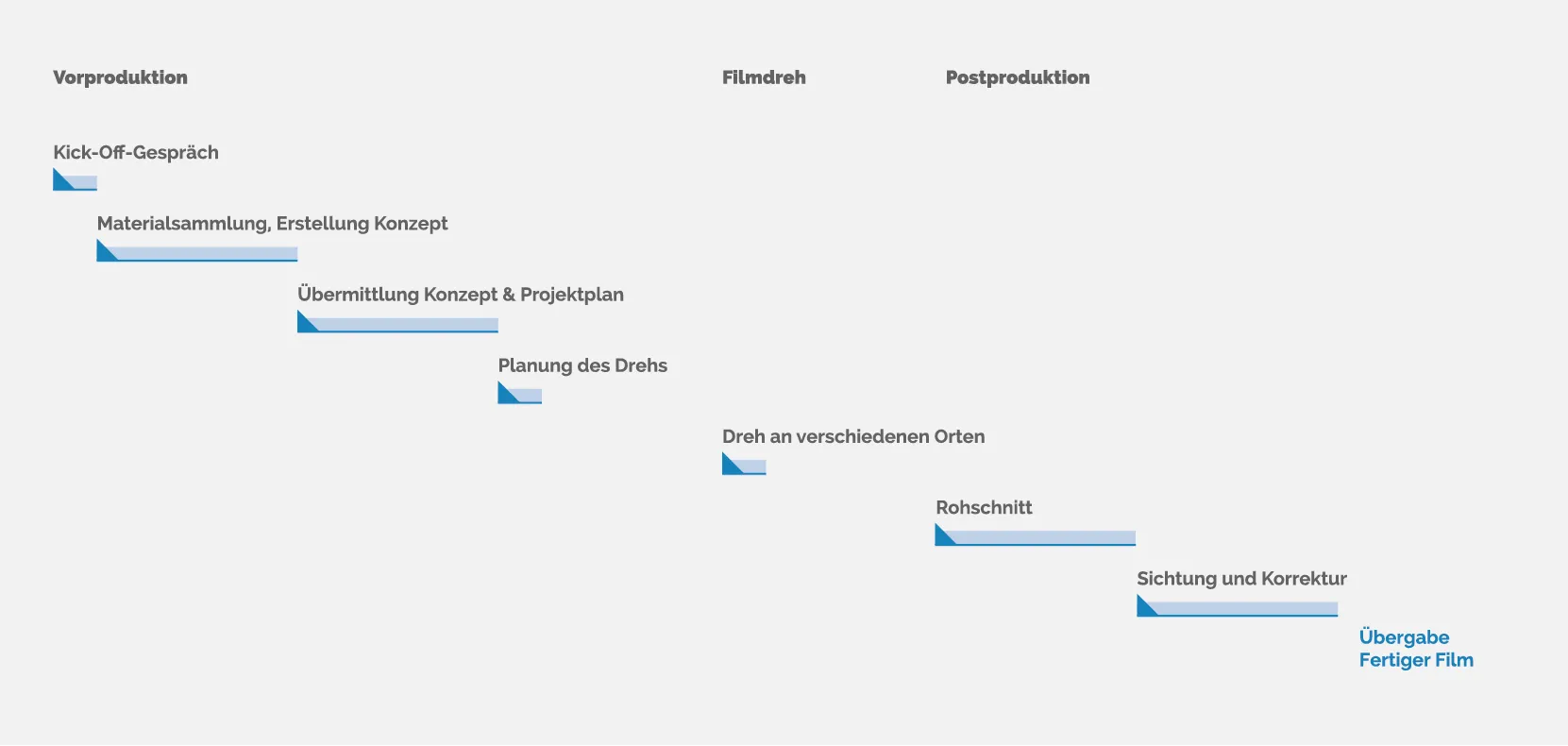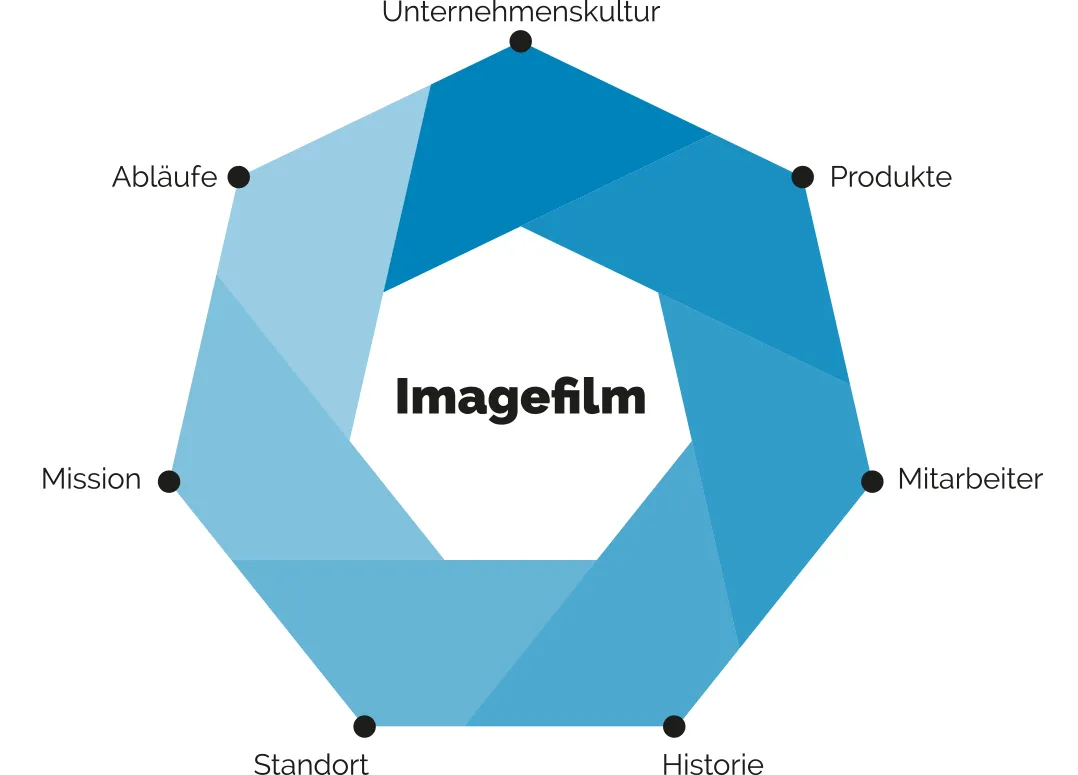Film production: the process
Summary
Every independent film production consists of three phases: pre-production, production, i.e. the actual film shoot, and post-production. While pre-production consists of planning the content and organization of the film to be made, the points developed in it are implemented in production - shooting. In post-production, the final film is created from the collected material: film editing, dubbing, animation, color editing. Each of these stages brings its own peculiarities and pitfalls and should therefore be considered from the beginning. Usually, film productions with us take 4 to 12 weeks. However, if desired, we can also shoot and edit a film within one day. We can proudly say that so far all of our 800 produced films have been finished on time.

In preparation for your production, we also offer you our step-by-step concept template for your new image film production and price template as a free download.
Conception and planning: The pre-production
Pre-production is the most important phase of a film production, especially in terms of the content of the final product. It is therefore absolutely necessary to invest enough time, communication effort and work in it. Because what has not been created in pre-production in terms of specifications is shifted to the editing stage and brings problems there that are difficult to rectify.
The conception usually begins with the first contact with us. After your first contact request via e-mail, we call you back quickly, define the rough framework of the film project with you and then send you a first rough, free and non-binding calculation within usually one to three working days. This often includes optional services that we advise or advise against, such as a specially composed film score, a make-up artist for the shoot, animations, additional shooting days, etc. Since often no concrete script has been determined at this point, this offer serves primarily as an orientation for you. Some clients have already discussed and clarified conceptual points of the film and general conditions in the context of internal communication at this point.
Afterwards, we meet with you on location at a location inspection and discuss the further content-related and conceptual procedure. All phone calls and e-mails - regardless of a commissioned offer - are of course free of charge during this phase. We usually offer a first get-to-know-you meeting free of charge if the approximate total budget of the production is known. This is usually the case after a first calculation has been discussed internally.
It doesn't matter whether you are planning a real film or an animated video: Everything starts on the content level with the formulation of a clear objective:
What facts do you want the viewer to understand after watching your video?
Or: what emotional message should the viewer feel? This objective can be formulated in advance with your colleagues, superiors and partner agencies or worked out directly with us. Sometimes a telephone call is sufficient for this, as for example with event films, where the content is already predetermined by the event on site. In the case of a complex image film or an explanatory animation film, on the other hand, this process is more protracted and complex. Please always keep in mind that this conception must be subordinated to the basic strategic goals of the company. The conception of an image film about a complete company is usually much more complicated compared to a recruiting film or product film, because it involves so many topics of the organization.

If the conception and idea generation process is more complex than usual, we also offer the individual commissioning of the conception, i.e. detached from the complete commissioning of the film project.
During the conception phase, the type of film is also determined. Possible types for a real film include, for example, high-quality product films, interview and statement films, glossy image films, commercials, trailers, industrial films and explanatory films. At the end of the conception phase, there is a written exposé, treatment, script or storyboard and a shot list and shooting schedule, i.e. a list of the specific filming to be done on location. The extent to which these content-related specifications are made in advance depends to a large extent on how precisely the conditions on location are known and can be influenced. For example, when shooting at a specially rented location with actors, it is possible to describe much more precisely what the film will look like than in the case of documentary on-location reportage with interviews without predetermined answers. In a scenic fictional film like this one, each scene should be conceptually fixed before shooting begins:
In this film of ours, the structure and composition of the film was not determined until the editing stage. Before the production, there was an in-hat determination of which motifs and systems should appear in the film, but only in the editing process did the actual structure emerge:
Example of a corporate film (Munich/Automotive)
This then results in the following organizational questions for you regarding the film shoot:
- Which locations are needed? These are either selected by us together with you after a location inspection at your company or researched, suggested and booked by us for locations that are outside your company.
- Which time of day and time of day is ideal? In addition to the best position for the sun, factors such as employee working hours, noise pollution or availability of the filming location also play a role here.
- What preparations, if any, need to be implemented on location (for example, booking rooms, setting up and rearranging)?
- Will all the products to be shown beworking by the shooting date?
- Which people need to be present in front of the camera during the shoot? Here, the rule is usually: the more, the better for the effect of the film. And do they know when they have to be where?
- What clothes should these people wear?
Especially for recruiting films or film shoots in production facilities, good internal planning at your company is very important.
Employees and team members at a film production
Cameraman: Duties & Salary
The task on the film set is to implement the film shots with his camera as it is the plan according to the concept. This means finding the right position and axis of view for the camera and setting it up correctly: Recording format, aperture, shutter speed, ISO, sharpness, etc.
A cameraman earns on the day before taxes and before costs for insurances, but without technical rent, about 300-1500€net per day. The daily fee in commercial film is not os high as in professional feature film, but significantly higher than in the journalistic environment. Daily rates are negotiated with the producer in advance.
Depending on how big a film production is in terms of budget and camera technology, camera assistants are available to hold the camera ready or even hold the camera in their hands during the shoot.
Director: Tasks & Salary
The director for fictional films and editor for editorial films has the task of keeping control of what is seen in front of the camera from a content point of view. He or she must coordinate closely with the cameraman so that he or she can implement the content specifications in a visually correct way. He is the most important person on the set and the direct contact person for the commissioning production company or producer.
A director earns, similar to the cameraman, 300-1500€netto per day. This amount does not include taxes and insurance.
Wir legen in dieser Phase auch großen Wert darauf, dass Sie rechtlich immer auf der sicheren Seite stehen. Wir weisen auf Situationen hin, für die Bildnutzungsrechte eingeholt werden müssen, stellen Einverständniserklärungen und Vorlagen zur Verfügung und holen diese bei Bedarf am Set auch ein. Das betrifft im Übrigen nicht nur die Bildrechte von Protagonisten, sondern auch die Nutzungsrechte von Sprechern, Kameramännern, Maskenbildern, Regisseure, Filmeditoren, Animationsspezialisten, Komponisten, Komparsen und Schauspieler.
Dreharbeiten: Die Produktion
Die Produktion ist meist die mit Abstand kürzeste Phase im Verlauf einer Filmerstellung, da die Dreharbeiten gerade im Werbebereich meist nach ein bis drei Tagen abgeschlossen werden können. Trotzdem ist sie oft auch die teuerste Phase, da sich alle Vorbereitung und der meiste technische Aufwand auf diese wenigen Tage konzentriert.
Die Crew muss zum Drehort anreisen und pünktlich da sein, die Schauspieler müssen wissen, was zu tun ist, die ganze Filmtechnik, die Requisiten, die Ausstattung und die Bühne bereitstehen und reibungslos funktionieren. Und auch inhaltlich müssen alle Fragen besprochen und geklärt sein, denn während eines stressigen Filmdrehs ist dafür keine Zeit mehr.
Je besser die Produktion daher inhaltlich abgesprochen und organisatorisch vorbereitet werden konnte, umso besser laufen diese Drehtage. Wir verfügen hier über eine langjährige Erfahrung, wissen um Fallstricke und versuchen diese im Vorfeld mit Ihnen aktiv zu beseitigen, zum Beispiel durch Pufferzeiten für eventuelle Verspätungen und Schlechtwetteralternativen für Außendrehorte. Alle Filmdrehs können bei uns pünktlich am Ende des Tages abgeschlossen werden! Dabei sind Zuverlässigkeit und offene Ansagen über eventuelle Verschiebungen am Drehtag oder Probleme am Drehort für uns selbstverständlich.
Filmschnitt, Vertonung und Animation: Die Postproduktion
Kurze Zeit nach dem Filmdreh übermitteln wir Ihnen einen Rohschnitt. In dem ist schon die Struktur festgelegt, Schnittbilder und Interviewpassagen sowie erste Animationen eingefügt und ein Musiklayout angelegt. Diese Filmversion stellen wir Ihnen in unserem Online-Filmfeedbacksystem zur Verfügung. Dabei handelt es sich um eine Log-In-Geschützte Online-Schnitt-Plattform auf der Sie, ihre Kollegen und Interviewpartner die Filmszenen ganz unkompliziert kommentieren und abnehmen können. Der zeitliche Aufwand für Filmproduktionen ist beim Filmschnitt auch stark davon abhängig, wie viele Animationen passend zum gedrehten Bild erstellt werden müssen. Gut zu sehen in diesem Beispiel:
Wir arbeiten dann die Änderungen ein, vervollständigen den Film und erstellen die finale Farbkorrektur und Vertonung (z.B. Musik, Geräusche, Sprechertext). Was sich so unkompliziert liest, kann aber ein langwieriger Prozess sein. Wir planen daher in unseren Kalkulationen immer ein Budget für Änderungsschleifen ein und kalkulieren nur dann nach, wenn diese Phase deutlich mehr Abstimmungsgespräche und Filmversionen in Anspruch nimmt als geplant.
Entsprechend der späteren Filmauswertung wird Ihnen der Film danach als Filmdatei (optimiert für YouTube, Messen, Veranstaltungen etc.), als Filmband (für TV-Sendeanstalten) oder als DCP-Datei (für die Nutzung im Kino) zur Verfügung gestellt.
Sollten Sie noch nicht über einen YouTube-Kanal verfügen, erstellen wir auch diesen gerne für Sie, laden die Filme hoch und schalten Videowerbeanzeigen. Die eignen sich besonders, um in bestimmten Regionen zu bestimmten Themen Zuschauer direkt auf das Video hinzuweisen. Sie bezahlen dafür an YouTube (Google) nur einen Betrag, wenn der Film auch tatsächlich angeschaut wurde. Die Kosten hängen hier vom Wettbewerb um die Zielgruppe ab, liegen aber meist im einstelligen Cent-Bereich pro Zuschauer. Mit 100€ erreichen Sie also schon 500 bis 1000 echte Zuschauer!
Der Weg zum fertigen Film, also die reibungslose Durchführung aller drei Produktionsphasen, erfordert neben Planung, Kommunikation und inhaltlicher Auseinandersetzung vor allem eins: Erfahrung, Erfahrung, Erfahrung. Vertrauen Sie mit uns daher einem Partner, der sich auskennt.
Und noch ein Hinweis zum Schluss: der Ablauf eines Filmes ist umso komplizierter und langwieriger, jeh mehr Personen, Abteilungen und Ebenen der Film im Unternehmen durchläuft. Wenn zu viele Personen, vor allem durch Feedbacks zum Filmschnitt in die Filmproduktion involviert sind, umso langwieriger ist die letzte Phase der Filmproduktion. Wir raten daher: Botschaften und Inhalte im Vorfeld breit zu sammeln und dann im kleinen Team die eigentliche Filmproduktion umsetzten. Im Nachhinein sollte man vor allem bei Filmen mit vielen Interviews Mitarbeiter über ihre Statements drüber schauen lassen, wie das häufig bei unseren Recruitingfilmen gemacht wird.
Im Vergleich zu diesem Film stand der Sprechertext schon vor dem Dreh weitesgehend fest und im Schnitt geht es nach dem Dreh schneller:
